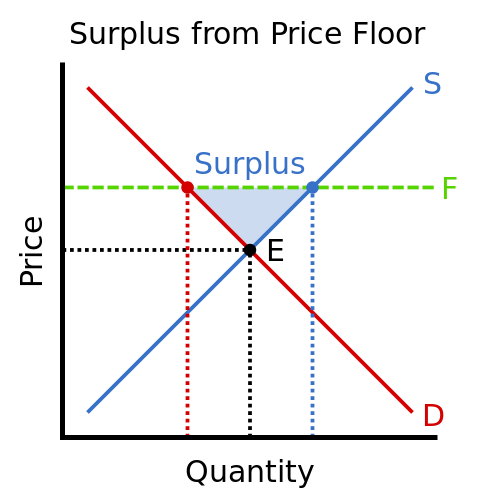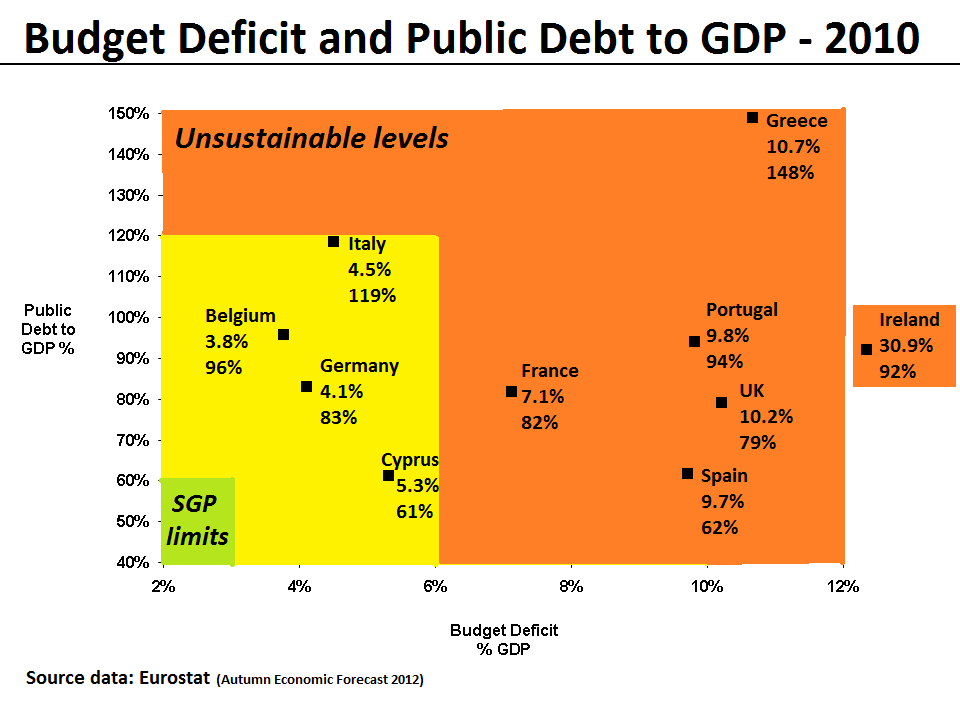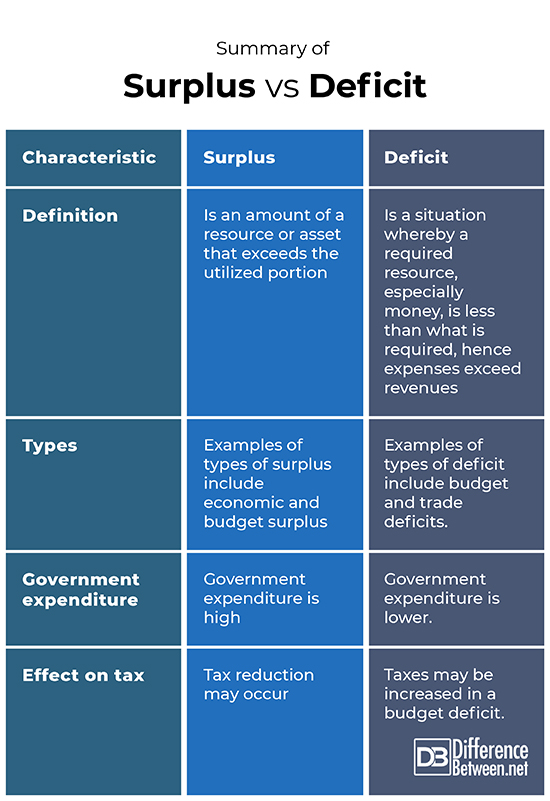Difference Between Surplus and Deficit
For an economy to be stable, the surplus and deficit budgets must be at equilibrium in a given fiscal period. However, this is not always the case as a surplus or deficit is a common occurrence in an economy. These affect government budgets and the entire economic activities including production and money spending habits, just to name a few. The two terms correlate, as they have to balance out.
What is Surplus?
This is an amount of a resource or asset that exceeds the utilized portion. It’s commonly used in the description of excess assets such as capital, income, profits, and goods, and occurs when there is a disequilibrium between demand and supply of a product or service. The disequilibrium distorts the product flow in the market. To ease this, the government may set a price floor, which is the minimum price under which a product or service should be sold. In budgets, a surplus occurs when incomes exceed the expenses.
There are various types of surplus, including:
- Economic surplus- This refers to the gain in the expected income from a given product. It can either be a consumer surplus or producer surplus. In a consumer surplus, the price of a service or product is lower in comparison to the highest price the consumer can pay. This hence favors the consumer. In a producer surplus, however, services and products are sold at a higher price than the normal price, which favors the producer.
- Budget surplus- This is prevalent when expenses are less than the incomes and is common in governments.
What is Deficit?
This is a situation whereby a required resource, especially money, is less than what is required, hence expenses exceed revenues. In a budget, the inflow of money falls short of the outflow, which can be a result of overspending.
There exist various types of deficits, including;
- Budget deficit- This occurs when spending exceeds the revenue available in a given period of time. Government deficits lead to an increase in national debt.
- Trade deficits- This occurs when imports are more than exports in a country. This may result in job reduction and a drop in domestic currency value.
Although deficits are viewed as problematic, they may be intentional. For instance, a government may create a deficit situation by increasing expenditure while decreasing revenue in a bid to boost the public’s purchasing power.
Similarities between Surplus and Deficit
- Both affect the economy by either causing an equilibrium or a disequilibrium
Differences between Surplus and Deficit
Definition
A surplus is an amount of a resource or asset that exceeds the utilized portion. On the other hand, a deficit is a situation whereby a required resource, especially money, is less than what is required, hence expenses exceed revenues.
Types
Examples of types of surplus include economic and budget surplus. On the other hand, examples of types of deficit include budget and trade deficits.
Government expenditure
In a surplus, government expenditure is high. On the other hand, in a deficit, the government expenditure is lower.
Effect on tax
During a budget surplus, tax reduction may occur. On the other hand, taxes may be increased in a budget deficit.
Summary of Surplus vs. Deficit
Summary of Surplus vs. Deficit
While both surplus and deficit affect the economy by either causing an equilibrium or a disequilibrium, a surplus is an amount of a resource or asset that exceeds the utilized portion while a deficit a situation whereby a required resource, especially money, is less than what is required, hence expenses exceeds revenues. To attain favorable economic conditions, both surplus and deficit should be at equilibrium.
- Difference Between Profit Center and Investment Center - July 2, 2022
- Difference Between Anti-Trust and Anti-Competition - June 6, 2022
- Difference Between Stocktaking and Stock Control - June 6, 2022
Search DifferenceBetween.net :
Leave a Response
References :
[0]Image credit: https://en.wikipedia.org/wiki/File:Budget_Deficit_and_Public_Debt_to_GDP_2010.png
[1]Image credit: https://upload.wikimedia.org/wikipedia/commons/thumb/e/e9/Surplus_from_Price_Floor.svg/500px-Surplus_from_Price_Floor.svg.png
[2]Andy Tanner. The Stock Market Cash Flow: Four Pillars of Investing for Thriving in Today s Markets. RDA Press, LLC, 2014. https://books.google.co.ke/books?id=zYIqAwAAQBAJ&pg=PT69&dq=Difference+between+Surplus+and+Deficit&hl=en&sa=X&ved=0ahUKEwiRi-at_fTiAhUL7eAKHfcnBVo4ChDoAQgxMAI#v=onepage&q=Difference%20between%20Surplus%20and%20Deficit&f=false
[3]Congressional Budget Office. Budget and Economic Outlook: Fiscal Years 2010-2021. Government Printing Office, 2011. https://books.google.co.ke/books?id=X2sRjpbDUxMC&printsec=frontcover&dq=Difference+between+Surplus+and+Deficit&hl=en&sa=X&ved=0ahUKEwiK9vOW_fTiAhUTA2MBHSMADl4Q6AEIWTAJ#v=onepage&q=Difference%20between%20Surplus%20and%20Deficit&f=false
[4]Hansen Bent. The Economic Theory of Fiscal Policy, Volume 3. Psychology Press, 2003. https://books.google.co.ke/books?id=83IzHgvrRRQC&pg=PA41&dq=Difference+between+Surplus+and+Deficit&hl=en&sa=X&ved=0ahUKEwiRi-at_fTiAhUL7eAKHfcnBVo4ChDoAQgrMAE#v=onepage&q=Difference%20between%20Surplus%20and%20Deficit&f=false



